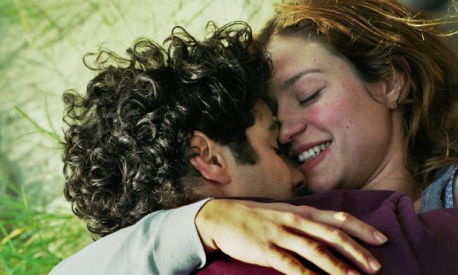(Originally posted at Lost in the Multiplex)
Piecing together the collected works of easily the most prolific voices in Belgian cinema, ‘The Dardennes Collection’ charts the successive career of writer-director partners Luc and Jean-Pierre Dardennes by assembling for the first time their six extraordinary feature films, starting with La Promesse (1996) and rounded off with their latest, The Kid with a Bike (2011). Recurrent darlings of the Cannes Film Festival (they have won the coveted Palme d’Or twice, whilst their work has successfully courted further awards and acclaim), the Dardennes remain a constant voice in understated, ultra low-budget filmmaking, painting broad thematic strokes with bristles so sharp, penetrating and honest that each project is a breathtaking melange of stark minimalism and remarkable mortality, with effortless humanity seeping out of each low-key pore.
Based in the city of Liège, the filmmakers have consistently set their films in and around the neighbouring steel town of Seraing, a setting whose urban decline mirrors perfectly the lingering deprivation explored within each of their consecutive pictures, films that mine social mores and ostensibly bleak circumstances. With their camera positioned almost always in uncomfortable close up or just over the shoulder of their various protagonists, the Dardennes actively shun mainstream fixations with preordained, unwavering character trajectory in favour of pursuing an interest and investigation of how the world (and indeed the microcosmic setting of Seraing) impinges on their characters, people who are, invariably, living on the fringes of society. Usually young, poor outcasts unaware of how to grapple with their destiny, their characters are those disadvantaged enough to have fallen through the cracks of contemporary urban society, and the filmmakers offer snippets of their autonomous lives which, due to the incredible performances of their troupe of regular actors, manage to stay with you long after the ambivalence of each film’s heart-stopping ending plays out.
Though they riff on a variation of the same thematic concerns, the Dardennes continue to produce a marked divergence from their possibilities as filmmakers, be it economical or political, and are very rarely restricted by their own valued consistency within art house cinema. In the many interviews that are littered throughout the collection, what is clear is the passion and dedication the brother’s bring to each of their films, which, spaced three years apart, are finely tuned sections of an inherently calculated tableaux. They continually test and challenge their stance as purveyors of urgent realism, honing the capacities of a distinctly naturalistic style (handheld camerawork, low-key lighting, etc) whilst refreshing their shared thoughts, feelings and attitudes towards civilisation at large. Viewed together, the six films described below provide both a damning indictment of the alienation of society and an insight into their working methodologies; an incidental criterion of time passing and a career that has seen them become perhaps the most humanistic filmmakers working in cinema today.
La Promesse (1996)
Marking the Dardennes feature filmmaking debut (after a handful of documentaries and false starts), as well as the first acting role for Jérémie Renier, La Promesse sees the Dardennes planting the seeds of their eventual, celebrated cinematic voice. Renier plays the teenage Igor, a mechanics apprentice who sidelines, under the stern tutelage of his father Roger (Olivier Gourmet), as an exploiter of illegal immigrants, making a living by smuggling them into the village and renting them apartments. When an African tenant is killed on Roger’s building site, Igor vows to protect the man’s wife and child, a moral dedication that slowly begins to clash with Roger’s mercilessly unaffected set of values. Charting Igor’s impressionable introduction to manhood and his uneasy quest for redemption, La Promesse is a fascinating examination of ethical degradation that plays out in what will become a customarily nimble concoction of stripped-down pragmatism. The film culminates – like their successors – in an enigmatic closing shot that leaves the character’s fates open to interpretation.
Rosetta (1999)
The winner of the Palme d’Or and Best Actress award at the 52nd Cannes Film Festival, Rosetta sees Émilie Dequenne play the titular role of Rosetta, a hardened young woman constantly at war with herself and her surroundings. Desperate to maintain gainful employment in order to move her and her alcoholic, child-like mother out of their current economic hardship, Rosetta stumbles from passive aggression to emotional vulnerability, relentlessly stifled by her journey to find what she believes is a ‘normal life’. Right from the opening frame, the Dardennes fashion their aptitude for creating unflinching character portraits by positioning their camera almost always behind or over the shoulder of their protagonist, allowing her constant forward motion to fuel the meagre narrative. Devoid of a pre-existing story, the film is a harrowing and uncompromising slice of social realist filmmaking, lifted by an uncompromising, guileless central performance from Dequenne who flourishes in an integral and ultimately stirring role.
The Son (2002)
Transcending the supporting roles and cameo appearances in the Dardennes’ five other films, Olivier Gourmet takes centre stage as Olivier, a man guarded by pride and his inability to communicate. Whilst teaching at a trades training centre (where he imparts his carpentering expertise), Olivier employs the adolescent Francis (Morgan Marinne) as his apprentice, fully aware that he is the previously incarcerated murderer of his son. What follows is a tense and quietly riveting inspection of the fractured nature of repression, as Olivier begins to battle with his inflamed internal agony and a newfound position as a surrogate role model to this disillusioned youth. Gourmet, an image of pent up rage and hatred, won the Best Actor award at the 55th Cannes Film Festival, and his is a performance that complements a stunningly simplistic tale of fraught torment played out on an ostensibly modest scale.
The Child (2005)
Reteaming with Jérémie Renier (and reclaiming the Palme d’Or at the 58th Cannes Film Festival), The Child is a devastating and emotionally nuanced story that studies the ramifications brought about by a string of ill-judged choices. Renier plays Bruno, a petty thief who, along with pregnant girlfriend Sonia (Déborah François), lives off their meagre benefits. Shortly after Sonia gives birth, Bruno sells their newborn child to a black market adoption ring in exchange for cash, a decision that stuns Sonia and compels him to quickly reverse his decision. However, once they get the baby back, Bruno’s debt to Sonia and the dangerous child-trading gang remains unpaid, causing him to take drastic measures to secure a future already in rapid descent. Although filled with unlikable characters suffocated by their own unsympathetic foibles, The Child is perhaps the Dardennes’ at their best, sculpting a complex and powerful portrayal of desperation and human suffering that refuses to deliver easy answers.
The Silence of Lorna (2008)
Maintaining similar themes brought across from The Child, namely the harsh alienation that comes with the commodification of humanity, The Silence of Lorna – which is considered to be one of their lesser works – is a glacial naturalistic thriller that examines anxieties brought about from immigration and marrying for identification. The film, which was awarded Best Screenplay at the 61st Cannes Film Festival, focuses on the filmmakers’ most mature set of characters: it stars Arta Dobroshi as Lorna, a woman in her mid-thirties who, as the benefactor of a complex marriage-for-sale racket, subjects herself to a gloomy web of deceit, complicity and guilt that leads to a bleak, reflective conclusion. Unusually for a Dardennes film, Lorna is active within a plot she is ultimately unable to take control of, and that is perhaps why this break from straightforward narrative progression leads the film to be slightly less engaging that the filmmaker’s previous works. Mysterious and multifaceted, The Silence of Lorna is nevertheless a tender portrayal of a sympathetic woman eager to help herself by helping others.
The Kid With a Bike (2011)
Winner of the Grand Jury Prize at the 64th Cannes Film Festival, The Kid with a Bike is the Dardennes’ most recent and contemporary work. Shifting from the industrial heart of Seraing to its leafy, sun kissed suburbs, the film stars Thomas Doret (in his acting debut) as Cyril Catoul, an uncontrollable 12-year-old boy who slowly succumbs to the affections of Samantha (Cécile de France) once he discovers his father (Renier) has abandoned him. Described by the filmmaker’s themselves as a modern fairytale, the film retains familiar elements both thematically and narratively (Cyril battling to find his place in the world), yet The Kid with a Bike differs from their usual styles, namely because it is uncharacteristically upbeat. Replete with fluid tracking shots and rousing (though jarring) non-diegetic musical interludes –something experimented with for the first time in The Silence of Lorna – the film is bright and summery, and sees the directors pushing their social concerns in spacious new directions. Although the frayed edges of Cyril and Samantha’s struggles are tied up too neatly, The Kid with a Bike is essentially recognisable but underscored by that most distorted element in all of the Dardennes Brothers’ films: it is pitilessly optimistic.











